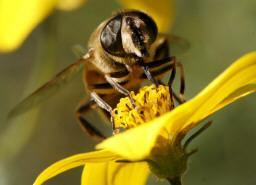Beekeepers and environmentalists took to the streets of Rome on Tuesday, calling for government action to ban pesticides they say are to blame for recent waves of bee deaths.
Around 200 protestors gathered outside the agriculture ministry, waving banners linking the death of over 40,000 bees in the last few months to the use of artificial forms of nicotine called neonicotinoids.
''No public research in Italy has proven a direct link to these substances but there is a clear causal relationship to mass bee deaths since these molecules were introduced into Italian farming,'' said Vittorio Cogaliati Dezza, head of environmental group Legambiente.
According to UNAAPI, the latest disaster to hit the nation's honeybee population - which fell by almost half in 2007 - coincided with the planting of maize crops. It said that 30-40% of hives had been affected.
UNAAPI said that while drought and disease could also be factors in the mysterious die-off, the key suspect was insecticide.
A number of studies have linked neonicotinoids, a seed treatment, to die-offs in bee colonies.
Some have suggested the insecticide leads bees to stop feeding larvae and results in a breakdown of their navigational abilities.
Although scientific conclusions have been mixed, France has imposed severe limits on the use of neonicotinoids on bee crops after mass die-offs in the 1990s.
During the Rome protest, a delegation led by the head of the National Union of Italian Beekeepers (UNAAPI) was invited into the ministry to discuss the issue with the rural development policies chief, Giuseppe Ambrosio.
Speaking after the meeting, Cogliati Dezza said Ambrosio had agreed to look into a possible moratorium on neonicotinoids.
''He has taken a week to assess the practicability of suspending the use of these killer substances, in order to acquire figures from beekeepers and look into French decisions on the issue,'' he said.
UNAAPI chief Francesco Panella said the undertaking from Ambrosio was ''a first step'' in the right direction.
But in addition to a ban on using neonicotinoids and other pesticides that poison bees, campaigners want urgent monitoring action across Italy to pinpoint the cause of the deaths.
They are also urging the Italian government to argue their case at the EU, calling for a Europe-wide assessment of the impact of chemical substances on bees.
It is estimated that some 200,000 beehives disappeared in Italy during 2007, causing a massive drop in honey output.
Similarly devastating declines in honeybee populations occurred in other European countries, as well as the US.
Experts have expressed fear that without honeybees to pollinate crops, their loss could have an enormous horticultural and economic impact around the world.
According to Italy's leading agricultural union Coldiretti, a third of all farming produce depends on insect pollination - 80% of which is carried out by bees.
If bees were to disappear it would not only destroy Italy's 25-million-euro honey industry but also affect most fruit crops including apples, pears, peaches, cherries, melons and citrus fruit, Coldiretti said.
The Italian bee industry is worth 1.6 billion euros annually, with each hive generating about 1,240 euros.









